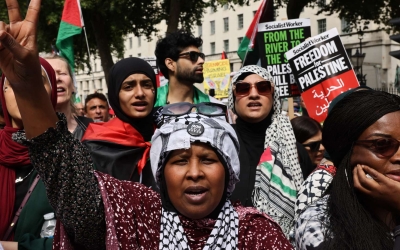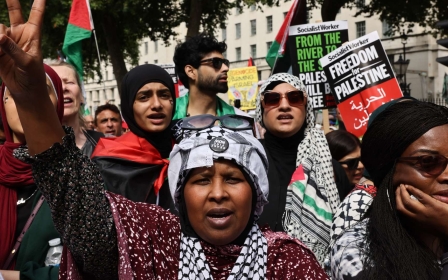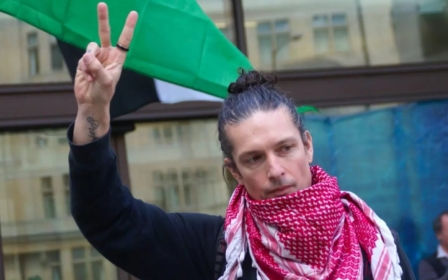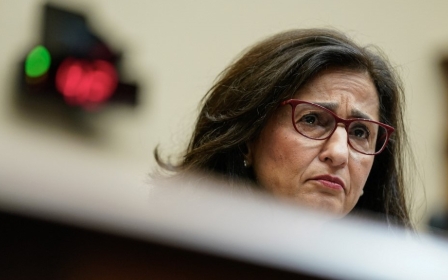UK: Police change start time for London pro-Palestine demo
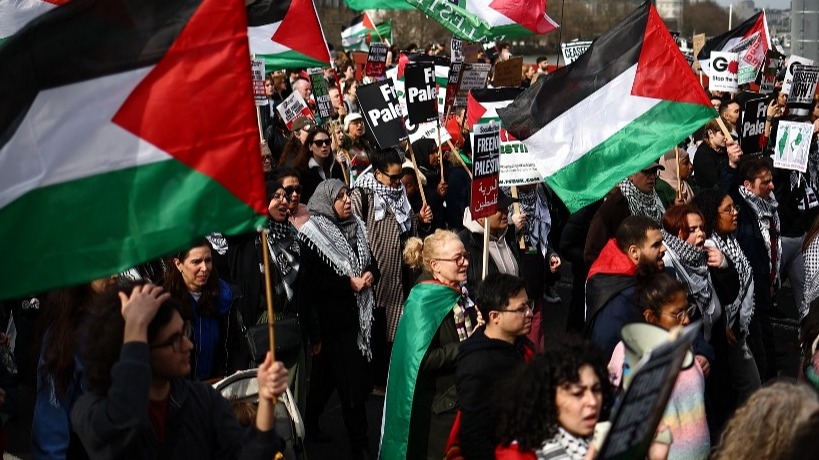
London's Metropolitan Police has removed restrictions which sought to push back the start time of Saturday's pro-Palestine march after being accused by organisers of trying to suppress their rights to protest.
The coalition of groups organising the demonstration, which is set to end near the Israeli embassy, said on Friday that the police had "backed down" less than 24 hours before the demonstration was scheduled after it had previously imposed public order restrictions preventing the march from starting before 2.30pm.
"With less than 24 hours to go the police has dropped its attempt to frustrate our national march for Palestine," the coalition said in a statement.
"Following a week of argument and attempts to bully and intimidate the demonstration organisers, the police have now agreed that protesters will assemble from 12 noon at Regent Street St James as we had previously planned."
In their own statement, the Metropolitan Police said that public order conditions had been "reviewed and amended" due to a "change in information".
New MEE newsletter: Jerusalem Dispatch
Sign up to get the latest insights and analysis on Israel-Palestine, alongside Turkey Unpacked and other MEE newsletters
Ben Jamal, who heads the Palestine Solidarity Campaign, said he was delighted the Met Police had “saw sense and abandoned their unjustified and impractical attempt to delay the start of the march by 2 hours on Saturday.”
“They never provided any convincing explanation or evidence for this delay, and it has caused enormous, unnecessary difficulty to the organisation of a large scale demonstration,” Jamal told MEE.
“It has unfortunately been part of a pattern of obstruction, delay and lack of communication on the part of the Met which we will press them to review and reflect on for future demonstrations. For tomorrow, we call on our supporters to turn out in their hundreds of thousands to show we will not be deterred from seeking an end to Israel's genocide and justice for Palestine!”
The new conditions still prevent the march from starting before 1.30pm. Previous restrictions issued by the police on Tuesday had forbidden protesters from gathering before 12:30 and from marching earlier than 2:30pm.
Middle East Eye understands that police also warned organisers that people attending the protest could be arrested if they breached these conditions.
Deputy Assistant Commissioner Ade Adelekan said: "Conditions were imposed to mitigate concerns from communities, including in relation to a specific event which would have clashed with the intended route of the march.
“The last-minute decision to cancel one of the other pre-planned events means we have reviewed the conditions imposed on the PSC march'
- Ade Adelekan, Met Police Deputy Assistant Commissioner
“The last-minute decision to cancel one of the other pre-planned events means we have reviewed the conditions imposed on the PSC march - this is in line with our legal obligation to balance the lawful right to protest and the risk of serious disruption to the wider community.”
On Thursday, the coalition organising the protest, including the Palestine Solidarity Campaign, Friends of Al-Aqsa, Stop the War Coalition and the Muslim Association of Britain, described restrictions imposed by the police as an attack on the protesters' right to freedom of assembly.
The coalition told journalists that it had notified the police of its intention to march on 7 September nearly a month before, on 8 August.
The organisers added that the police would often cancel meetings at the last minute and been "confrontational" since they began marching last year.
Pro-Palestinian demonstrations attended by tens of thousands of people have taken place regularly in London since the start of the war on Gaza last October.
For the first time on Saturday, however, organisers plan to march from the centre of the city to the Israeli embassy in Kensington, west London.
Counter-demonstration at embassy
Saturday’s march coincides with a counter-demonstration organised by a group called Stop the Hate UK, which appears to have been first announced on social media three days ago.
In subsequent posts on social media, it called on people to gather outside the Israeli embassy on Saturday afternoon to remember the 364 people killed by Palestinian militants and others taken hostage at the Nova music festival during the 7 October Hamas-led attacks in southern Israel.
"Let’s dance for those who cannot. Let’s dance to keep their spirit alive. Let’s dance to bring them home. Join us. Spread the word. Let’s make it a big one," the group said in a post promoting the event, which it has also dubbed "Party at the Embassy!"
One organiser of the pro-Palestine march told MEE that police wanted to keep the two events apart.
“The police, this time they wanted to ensure the protest would not coincide with a counterdemonstration outside the Israeli embassy, which was announced three days ago.
“The police said they wanted to delay us leaving so the other protest can come through, but it looks like another tactic to delay and stop us practising our democratic right.”
During previous national marches the police have imposed public order restrictions in the area outside the Israeli embassy, giving themselves powers to restrict protest in a given area by arresting any individuals who plan to protest there.
The latest guidance published by the police sets out conditions, including times and locations, at which protesters are permitted to gather and march, and the route of the march from Regent Street to a gathering point on Kensington Road, south of Hyde Park.
It prohibits protesters from entering the road on which the Israeli embassy is located, entrance to which is usually restricted by a security barrier, as well as from gathering on a short stretch of Kensington High Street in front of that junction.
Middle East Eye delivers independent and unrivalled coverage and analysis of the Middle East, North Africa and beyond. To learn more about republishing this content and the associated fees, please fill out this form. More about MEE can be found here.


